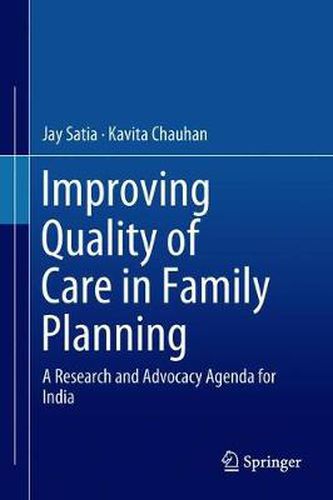Readings Newsletter
Become a Readings Member to make your shopping experience even easier.
Sign in or sign up for free!
You’re not far away from qualifying for FREE standard shipping within Australia
You’ve qualified for FREE standard shipping within Australia
The cart is loading…






This title is printed to order. This book may have been self-published. If so, we cannot guarantee the quality of the content. In the main most books will have gone through the editing process however some may not. We therefore suggest that you be aware of this before ordering this book. If in doubt check either the author or publisher’s details as we are unable to accept any returns unless they are faulty. Please contact us if you have any questions.
In this book the authors review initiatives in improving the quality of care for family planning in India and bring them to the broader forum of policy-level discussions. The global Family Planning 2020 (FP2020) framework argues for voluntary rights-based family planning programmes. The rights-based approach builds on the bedrock of quality of care, which means listening to what women want, treating individuals with dignity and respect and ensuring that everyone has access to full information and high quality care. Improving the quality of care in family planning services in a country like India is crucial from individual, national and global considerations. This book critically discusses and evaluates the various interventions undertaken so far and the reasons for success and failure. It also synthesizes current research studies in India, identifies gaps and presents a research agenda to bridge this gap and accelerate progress towards improving quality of care in family planning. It presents a comprehensive framework that underscores the importance of health systems and community environments in creating enabling, motivating and empowering roles for providers and clients. The examples and perspectives presented in this book make a strong case for adoption into policy frameworks and scaling up of quality of care efforts, and identifying research priorities for strengthening the response to family planning. This book greatly contributes towards enhancing the quality of family planning care at the grass-roots level in low resource settings and is of interest to researchers and practitioners of public health, particularly community health, maternal and child health, and social work.
$9.00 standard shipping within Australia
FREE standard shipping within Australia for orders over $100.00
Express & International shipping calculated at checkout
This title is printed to order. This book may have been self-published. If so, we cannot guarantee the quality of the content. In the main most books will have gone through the editing process however some may not. We therefore suggest that you be aware of this before ordering this book. If in doubt check either the author or publisher’s details as we are unable to accept any returns unless they are faulty. Please contact us if you have any questions.
In this book the authors review initiatives in improving the quality of care for family planning in India and bring them to the broader forum of policy-level discussions. The global Family Planning 2020 (FP2020) framework argues for voluntary rights-based family planning programmes. The rights-based approach builds on the bedrock of quality of care, which means listening to what women want, treating individuals with dignity and respect and ensuring that everyone has access to full information and high quality care. Improving the quality of care in family planning services in a country like India is crucial from individual, national and global considerations. This book critically discusses and evaluates the various interventions undertaken so far and the reasons for success and failure. It also synthesizes current research studies in India, identifies gaps and presents a research agenda to bridge this gap and accelerate progress towards improving quality of care in family planning. It presents a comprehensive framework that underscores the importance of health systems and community environments in creating enabling, motivating and empowering roles for providers and clients. The examples and perspectives presented in this book make a strong case for adoption into policy frameworks and scaling up of quality of care efforts, and identifying research priorities for strengthening the response to family planning. This book greatly contributes towards enhancing the quality of family planning care at the grass-roots level in low resource settings and is of interest to researchers and practitioners of public health, particularly community health, maternal and child health, and social work.